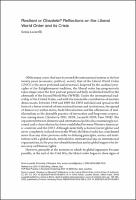Chapter Resilient or Obsolete? Reflections on the Liberal World Order and its Crisis
Abstract
From its beginnings, in the aftermath of the first post-war period, the liberal order has significantly changed the texture, actors and tones of international politics, aiming to create institutions and rules that harnessed the forces that for centuries led political communities to wage war. Never fully realized, the liberal order has produced the most significant network of connections between societies, going so far as to make war unlikely in the areas where it has established itself most profoundly. An ambitious model which, refusing to separate the peaceful space of liberal democracy from the international one of Westphalian states, it promised widespread well-being, security and prospects for progress for individuals and groups. Today, however, many of its promises have been broken, illiberal actors have taken on ever-increasing economic and political weight, and the liberal world has become fragmented and weakened. Moreover, the crisis of liberal democracy within states and the phenomena of “autocratization”, as well as the difficulty of liberal societies in giving effective responses to the challenges posed by a rapidly evolving technological world, represent challenges that make the liberal order's resilience uncertain. This chapter aims to analyze the main features of the crisis of the liberal order to evaluate its possible evolution.
Keywords
international order; liberal order; multilateralism; crisisDOI
10.36253/978-88-5518-595-0.14ISBN
9788855185950, 9788855185950Publisher
Firenze University PressPublisher website
https://www.fupress.com/Publication date and place
Florence, 2022Series
Studi e saggi, 238Classification
Political science and theory


 Download
Download Web Shop
Web Shop